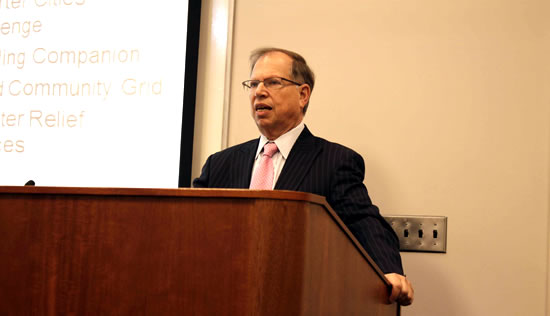Baruch College Discusses P-TECH
By Jasmine Bager

Stan Litow, President of IBM International Foundation
Will six years of high school be better than four? And will weaving-in practical problem solving skills, technology and the arts—in addition to reading, writing and math—help to prepare the leaders of tomorrow? That was a discussion at Baruch College’s recent forum on higher education innovation. Stan Litow, president of the IBM International Foundation and vice president of Corporate Citizenship & Corporate Affairs, served as the keynote speaker.
The concept is simple: high school students remain at the school for two additional years and take college credit, while being mentored and coached by professionals in the industry. Launched in Brooklyn three years ago, Pathways in Technology Early College High School, or P-TECH, is an innovative new public high school model for grades 9-14. It is in partnership with New York City Department of Education, City University of New York (CUNY), New York City College of Technology (City Tech) and IBM. When these students do graduate, they will have also earned an Associate in Applied Science degree or an Electrochemical Engineering Technology degree—at no cost to them. This degree will enable them to transfer to a four-year college and continue studying, or to jump right into an entry-level position in the Information Technology (IT) industry. The initiative hopes to help focus students on STEM (Science, Engineering, Technology and Math), without neglecting the liberal arts. This, educators hope, will serve as a seamless transition from high school to college or to a job. So far, 335 students are enrolled, including 60 percent of black and Hispanic males, who are traditionally underrepresented in colleges across the US. They work closely with the Sarah E. Goode STEM Academy in Chicago, which opened in 2012, and has a similar model. Combined, there are 28 schools, spread across Chicago, NYC, NY State and Connecticut. More schools are planned for 2014 and beyond.
“All high school graduates must be college ready, and currently, there is a gap in skills. This doesn’t cost a nickel. This is about reinventing high schools in America and offering high quality education.” These high schools will provide paid IBM internships to the students and match them up with mentors who will actively be involved with the students. These graduates will be “first in line for jobs at IBM,” and the skills learned will set them apart from students who rush straight into college without the support that this program provides.
Litow stressed how the high school years are critical to help shape the young minds and that the education community cannot do it alone. IBM is there to help. By combining social and business initiates, IBM, and other technology companies, use Cloud, business analytics, voice recognition and social media networking. If students are better prepared, then they will make better employees and citizens, is the conclusion. The curriculum is carefully mapped out by experts and ensures that the graduates will be prepared to enter the workforce or higher education.
“Let’s solve this problem together. We are not interested in who created the problem, we are interested in helping to find a solution,” Litow said.
As a result of globalization, an entire generation has grown up glued to smartphones and able to decode complex technology—but without truly mastering some basic problem solving skills. Litow, and the educators at Baruch, are hoping to shift that.
The Higher Education Innovation Project at Baruch College was in collaboration with the Shelly & Donald Rubin Foundation.#
Jasmine Bager is an assistant editor at Education Update and a graduate of the Columbia School of Journalism.
